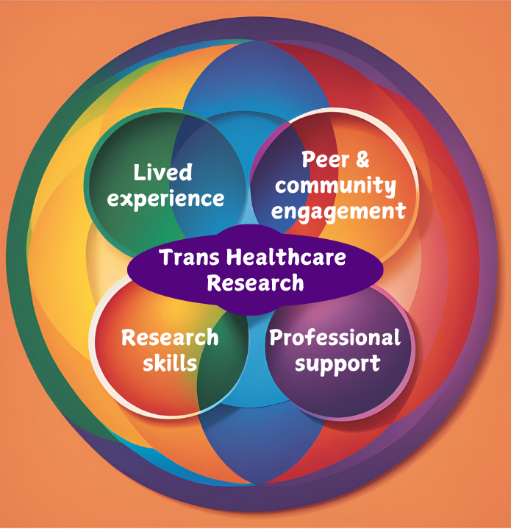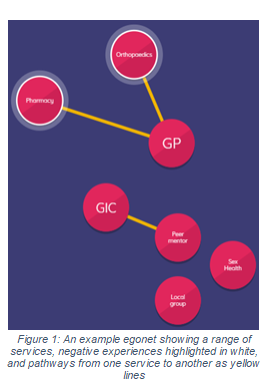The Trans Complex Healthcare Pathways Study
Published: 3 December 2024
This study focuses on the experiences of trans, non-binary, and gender-questioning individuals with gender-affirming healthcare, both within and outside of gender clinic settings.

Since November last year, work has been underway to plan this research into trans, non-binary and gender questioning people’s experiences of gender affirming healthcare, within and beyond the gender clinic setting. This is one of the Scottish Government’s priority topics for trans health research which is funding the study.
Engagement with advisors
The study is led by Dr Nolwazi Nadia Ncube with Research Assistants George Burrows (April to October 2024) and Dr Mahnoz Illias (October 2024 to present). We also have a fantastic Advisory Group of four people who bring a rich and valuable mix of skills and experience. Each advisor has lived experience of gender affirming services, supports trans people professionally or as a volunteer, or both. Some also have research skills from their involvement in other trans health studies.

The research staff have worked with the advisors to agree the research questions, publicity like the logo and trying out the interview before it goes live. We are interested in knowing about relevant experiences with health services, third sector organisations, peer support and other social connections. These can all contribute to people’s experiences of gender affirming care, and this is the complex bit of the healthcare pathways that we want to find out about.
Value of the data: a new approach
We have adopted a novel approach to this study. It uses mixed methods, meaning we are using more than two types of information to come to our findings at the end of the study. We are using a type of social network map that names each service or person and how they connect through successful or unsuccessful referrals. The maps are created in a programme called Network Canvas. This is an example of the kind of map we could create in an interview:
We are also asking about examples of what has worked well or not so well. These examples will help us to understand which services and types of people are helpful and the ways that they could be better.
Value of the research: advisors’ views
The research team, including the advisors, see trans healthcare pathways as a valuable research topic. We are excited to be hearing from participants about their wide range of experiences of gender affirming healthcare, then using the data to bring new insights that can shape policy and practice. Some of the advisors have also let us know why this study is important.
“This study will give us valuable insight into where and how trans and non-binary people access gender identity healthcare in Scotland. Gender identity healthcare systems are often incredibly difficult for trans and non-binary people to navigate, and this research will give us a better understanding of how complex these journeys can be. It will also give us more information on where people are accessing support. With waiting times for GIC's being as long as they are, we know that people are having to turn elsewhere to get help - this research will show us where those places are.”
“This study is important to show people what we go through as trans people accessing care. It’s not a linear process for most, and it’s great that this study acknowledges the wide array of services that a trans person might have to access to receive their care. Aside from the implications the study will have for improving gender-affirming care, it is also a great opportunity for trans people to map out their own pathway as a reflective exercise.”
After the interviews
The research team will be working hard to understand the information shared by all participants. Advisors will also be asked to give their views on the themes, to ensure that the data is being analysed correctly. A report will be written for the Scottish Government to tell them the findings of the research. There will be a chance for professionals to hear the findings of the study and to think about how they might use the findings in their work. There will be an event for people with their own experience of gender affirming healthcare services to find out about this study’s findings and other trans health research going on in the university.
Trans and Non-Binary Health Research Community Forum
We will be holding a Trans and Non-Binary Health Research Community Forum, tentatively in February 2025 to share information and some preliminary findings from ongoing trans health research projects at the University of Glasgow, including the TCH Pathways study (within the College of Medical, Veterinary and Life Sciences. If you are interested in attending the event, please email tchpathways@glasgow.ac.uk for more information and how to register.
First published: 3 December 2024


